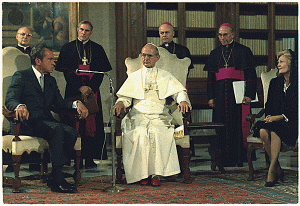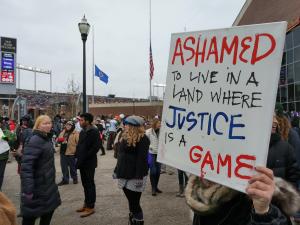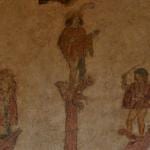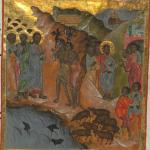
Pope St. Paul VI, addressing a group of United States Congressmen in the bi-centennial year of 1976, indicated that their service was to follow the ideals of the Declaration of Independence, that is, they were to defend life and promote true liberty and happiness for all the people of the United States:
By the sacred trust committed to you by the people, and in loyalty to your very Declaration of Independence, you have been called to the service of defending life and of promoting true liberty and happiness among your people.[1]
Pope St. John Paul II, in his address to Congress in 1982, similarly stated that Congress, following the best teachings contained within the Declaration of Independence, must be courageous advocates for human rights, not just for those within the United States, but for all:[2]
You are called upon to champion human dignity within your country and beyond its boundaries.
You are called to be courageous advocates of human rights – especially those inalienable rights proclaimed by your own Declaration of Independence: the right to “life, liberty and the pursuit of happiness”. To defend and protect human life, to help all your brothers and sisters live as free people pursuing that true happiness willed for them by the Creator – this is indeed a splendid mission.[3]
Likewise, John Paul II, in his address to Lindy Boggs, the ambassador to the Holy See under President Clinton, explained that the principles founded at the start of the United States are such that they should propel the country to become better, to become more inclusive of the rights and needs of others over time:
The moral history of your country is the story of your people’s efforts to widen the circle of inclusion in society, so that all Americans might enjoy the protection of law, participate in the responsibilities of citizenship, and have the opportunity to make a contribution to the common good. [4]
And, at Logan Circle, John Paul II explained that the rights promoted by the Declaration of Independence are universal human rights, rights which Christians must not only promote, but complement with the Gospel Message. Christians, far from undermining or rejecting such human rights and the common good implied by them, must recognize them as an aspect of the reality of humanity itself, affirmed by the incarnation:
As citizens, you must strive to preserve these human values, to understand them better and to define their consequences for the whole community, and as a worthy contribution to the world. As Christians, you must strengthen these human values and complement them by confronting them with the Gospel message, so that you may discover their deeper meaning, and thus assume more fully your duties and obligations toward your fellow human beings, with whom you are bound in a common destiny. In a way, for us, who know Jesus Christ, human and Christian values are but two aspects of the same reality : the reality of man, redeemed by Christ and called to the fullness of eternal life.[5]
Thus, the ideals behind the Declaration of Independence, even though they were not properly followed or understood by the Founding Fathers of the United States, propel us to promote the common good, and so work for justice for all. When basic human rights are undermined or rejected, it is our responsibility to promote them and make sure they are put into effect. This is why, as history progresses, we should establish a wider circle of inclusion in society. When we find people opposing this inclusive affirmation of the rights of all, it our duty to stand our ground and do all that we can to affirm them and promote the dignity of all. Anyone who opposes basic human rights, thinking they should be limited and affirmed only for a select few, undermine the common good and with it, humanity as a whole. Christians, because of the affirmation of humanity in Christ, must recognize that all attacks against the common good, all attacks against the greater distribution of justice and promotion of human rights for all, fights against the work of the incarnation, for the incarnation seeks to promote and restore justice for all.
The Declaration of Independence therefore is right to promote, not only the equality of all humanity, but that every person, by sharing in that common humanity, must be guaranteed basic rights:
We hold these truths to be self-evident, that all men are created equal, that they are endowed by their Creator with certain unalienable Rights, that among these are Life, Liberty and the pursuit of Happiness.
When these rights are under attack, when lives are willingly thrown away or seen as worthless, then justice is undermined. The Christian response must be to resist such injustice. When it is society which promotes such injustice, Christians must respond by promoting social justice. And, as suggested by the words of Pope John Paul II , we must not reach back into the past and use it to suggest various forms of social injustice are acceptable merely because of precedent; rather, whenever we see such precedent in the past, we will work to overcome it, which is exactly one of the ways we widen the circle of inclusion in society. [6] We cannot just look back to what was originally done and think justice will be served; rather, we must look to the present, see where rights are neglected and injustices are promoted, and find a way to fix the problems before us, so that justice can reign.
But when a long train of abuses and usurpations, pursuing invariably the same Object evinces a design to reduce them under absolute Despotism, it is their right, it is their duty, to throw off such Government, and to provide new Guards for their future security
When governmental authorities exorcise their power to promote injustice, they must be challenged, and replaced if they are unwilling to change their ways and fix the injustices which they have established. Those who, likewise, are in some position to guard and protect the system, do so, not to protect the principles of the system, but the powers that be, with all the injustices the system presently promotes, must be cast out and replaced with new guards, with new people who promote a greater vision of justice and will do what they can to make justice reign. The spirit of this principle is found in those critical of police brutality and the system currently in place which protects a long train of abuses and usurpations against human dignity by the police; such critics want changes, they want the system of abuses eliminated, and new guards, new ways established to promote the common good.[7] Indeed, they feel that, until recently, their complaints had been so ignored, that they could say, as it were, In every stage of these Oppressions We have Petitioned for Redress in the most humble terms: Our repeated Petitions have been answered only by repeated injury.

Like the Founding Fathers of the United States, we must say that there comes a time when we must say, “No more!” Brutality cannot be accepted. Systematic abuses have become features, not bugs in the current system. Reform is necessary. New guards, new principles, new ways must be established, so that human dignity, human life, can be protected. There must be no more Walter Scotts, no more George Floyds, no more Atatiana Jeffersons, no more Breonna Taylors, no more Tamir Rices, no more Rayshard Brooks: each and every such death, and all the abuses which do not lead to death, are injustices which cry to heaven. Each one of them shows the failure of the system in place. Even if there will not be, and cannot be, a perfect system, this does not mean we should not do what we can to make things better; rather, we must always be trying to be better, making improvements, and not letting things go just because it seems hard, if not impossible, to make for a more just system.
If we truly believe in human rights, if we believe in the principles set in the Declaration of Independence, then we must make sure they are more than ideals, but principles which are acted out, principles which are put into wider use every day. Every time they are fought against and someone tries to undermine them, we must respond with demands for justice. Christians, of course, have hope in such justice, after all, that is their eschatological hope, that in Christ, everyone will indeed find life, dignity, and happiness. Christians are to serve as Christ’s workers in the world, to help in that messianic work; when we ignore injustice, or worse, when we promote it, we no longer follow Christ, but the spirit of anti-Christ, to our shame.
[1] Pope St. Paul VI, “Address to a Group of Representatives of the Congress of the United States” (5-26-1976).
[2] This is why, if some political leader within the United States dismisses the rights of non-US citizens, they act contrary to the principles established by the Declaration of Independence. The Founding Fathers believed that natural rights, when discerned and understood, transcended human governance. This is how they justified their disobedience to Great Britain in the Declaration of Independence: because they believed Great Britain had violated basic human rights with its demands. Similarly, we must acknowledge and promote the same basic human rights today. If some government violates those rights, that government, insofar as they violate such rights, has lost its authority. For example, if someone were to deny rights to migrants because they are not citizens of the United States, they are violating the principles established by the Declaration of Independence. No American should consider themselves a true patriot if they reject the principles by which the United States was established, and the United States loses its moral authority if its leaders and governmental agencies act contrary to the rights which are to be guaranteed to all.
[3] Pope St. John Paul II, “Address to the Congressmen Of the United State” (1-18-1982). ¶3.
[4] Pope St. John Paul II, “To H.E. Mrs. Corinne (Lindy) Claiborne Boggs, New Ambassador of the United States to the Holy See” (12-16-1997).
[5] Pope St. John Paul II, “Homily at Logan Circle” (10-3-1979). ¶3.
[6] Christians had to learn this lesson as early believers had to accept and share the Gospel message with the whole world.
[7] There is, to be sure, a debate on what those reforms should be. That debate is important. But before that debate can be entered, we must come into an agreement that there is a problem, and we cannot expect to put a band-aid on an open wound and expect things to get better. We need drastic reform.
Stay in touch! Like A Little Bit of Nothing on Facebook.
If you liked what you read, please consider sharing it with your friends and family!













